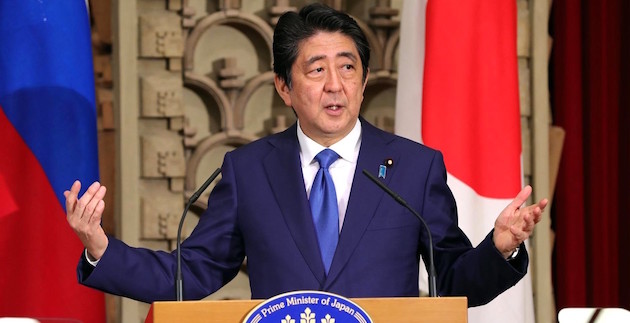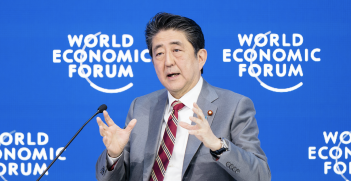Fast-Tracking Constitutional Revision in Japan

With scandals and controversy dogging him, Shinzō Abe’s push for constitutional revision seems like the perfect distraction. However, in his haste to realise constitutional reform, is Abe further harming his chances for political survival?
At a gathering of members of Japan’s governing Liberal Democratic Party (LDP) in June, Prime Minister Shinzō Abe announced his intention to submit his proposal to revise Japan’s constitution to the Diet by the end of 2017, rather than in 2018 as was widely expected. While revising the constitution, particularly the peace clause Article 9, has been a pet project of Abe’s since becoming prime minister for a second time in 2012, his decision to bring forward the timetable for constitutional revision has come as a surprise. It has been seen as an attempt to arrest the decline in his approval ratings that could have serious ramifications for Japan and the LDP.
Revising Japan’s constitution in order to remove Article 9, which renounces Japan’s right to wage war, has been one of Abe’s pet projects for a long time. Abe has made clear his belief that Article 9is outdated and should be amended. He wants to enable Japan’s defence forces a greater ability to undertake military operations. Abe’s ambitions have, however, been curtailed by parties in favour of constitutional revision not having a two-thirds majority in both houses of the Diet, a requirement for the passage of any bill to revise the constitution.
When Abe gained the required numbers after success in the 2016 elections to the House of Councillors he started to move towards beginning the process of constitutional revision. In May 2017 he announced his desire for the constitution to be changed by 2020.
Abe’s desire to fast-track constitutional revision may, as some have speculated, be linked to a decline in his approval ratings. The most recent polls put approval for the Abe cabinet at 35.8 per cent, a revelation that has shocked senior members of the LDP. This fall can be attributed to Abe’s handling of a number of scandals and his government rushing a controversial bill through the Diet. In addition, the LDP suffered a heavy defeat in the Tokyo assembly elections that were held on the 2 July; this defeat has reflected badly on Abe and his government and has put further pressure on Abe. With his government beginning to run into difficulties, Abe clearly decided that a distraction was needed and that fast tracking constitutional revision would, given the controversy surrounding the issue, be a perfect opportunity to distract the public’s attention.
While fast-tracking constitutional revision is a convenient distraction for Abe, it is not without ramifications. The ramification that deserves the most attention is the possible reactions from China and South Korea to this move. Both China and South Korea have long opposed Japanese remilitarisation and regard any attempt by Japan to revise its constitution in order to change Article 9 as Japanese ‘remilitarisation’. Fast-tracking constitutional revision will undoubtedly be met with protest and condemnation from the Chinese and South Koreans and will cause further deterioration in Japan’s relationship with these two countries.
Another potential ramification of fast-tracking constitutional revision could affect the standing of the LDP among the Japanese people. Revising the constitution with an eye of amending or abolishing Article 9 is a very contentious issue in Japan, with the public split on the merits of revision. Fast tracking it could prove unpopular. Already Abe’s announcements have earned him the ire of legal experts and any negative publicity that may arise from Abe’s decision could affect the LDP’s standing among voters. Furthermore, after the bill is approved by the Diet, it must be approved by voters in a referendum. Should the proposal to revise the constitution be rejected by Japanese voters it could have a severe impact on Abe’s standing as prime minister.
The ramifications of attempting to fast-track constitutional revision notwithstanding, Shinzō Abe clearly wants his constitutional revision agenda implemented sooner rather than later. While it has been a long-held ambition for him the newfound urgency that has arisen appears to be very much a product of the need to distract the Japanese public away from the scandals and issues that have been building up and to arrest the decline in his standing in the opinion polls.
Jim Medew is an intern with the AIIA National Office. He completed a Master of Arts in international relations at Deakin University in 2015.
This article is published under a Creative Commons Licence and may be republished with attribution.





